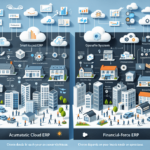Comparing FinancialForce ERP and Infor CloudSuite Industrial (SyteLine)
Selecting the right Enterprise Resource Planning (ERP) system is crucial for optimizing business operations and driving growth. FinancialForce ERP and Infor CloudSuite Industrial (SyteLine) are two leading solutions in the market, each offering unique features tailored to specific business needs. This comprehensive comparison delves into their functionalities, pricing, implementation processes, and more to help you make an informed decision.
Overview of FinancialForce ERP
Key Features
- Financial Management: Comprehensive modules for invoicing, accounts payable, and general ledger.
- Supply Chain Management: Efficient inventory management and order fulfillment capabilities.
- Human Resources Management: Payroll processing and employee benefits administration.
- Project Management: Resource scheduling and time tracking tools.
- Reporting and Analytics: Advanced dashboards and data visualization for real-time insights.
- CRM Integration: Seamless integration with Salesforce for unified sales and service management.
Benefits
FinancialForce ERP offers real-time financial insights and high scalability, making it ideal for businesses of varying sizes. Its cloud-based architecture ensures easy access and flexibility, while the integration with Salesforce enhances customer relationship management and sales processes.
According to Gartner, cloud-based ERP solutions like FinancialForce are gaining traction due to their scalability and lower upfront costs.
Overview of Infor CloudSuite Industrial (SyteLine)
Key Features
- Supply Chain Management: Robust inventory management and demand planning tools.
- Manufacturing Operations Management: Production scheduling and quality control systems.
- Financial Management: Modules for invoicing and accounts payable.
- Sales and Customer Management: Efficient order management and customer service functionalities.
- Reporting and Analytics: Comprehensive dashboards and data visualization tools.
- Project Management: Capabilities to track project timelines, allocate resources, and manage budgets.
Benefits
Infor CloudSuite Industrial is tailored for manufacturing and distribution businesses, offering extensive tools to streamline production and supply chain operations. Its high level of customization allows businesses to adapt the system to their specific workflows, enhancing operational efficiency.
Industry reports from Forrester highlight Infor's strong presence in the manufacturing sector due to its specialized features and scalability.
Key Differences Between FinancialForce ERP and Infor CloudSuite Industrial
The primary distinction lies in their target markets and deployment approaches. FinancialForce ERP is designed for Salesforce users across various industries, emphasizing financial and project management. In contrast, Infor CloudSuite Industrial focuses on manufacturing and distribution, offering specialized tools for these sectors.
Another significant difference is in implementation. FinancialForce ERP, being cloud-based, typically requires a shorter implementation period, often completed within weeks. In contrast, Infor CloudSuite Industrial, which can be deployed on-premise, may take several months to fully implement due to its extensive customization options.
Additionally, FinancialForce offers a more flexible pricing model based on user count, whereas Infor's pricing is module-based, which can lead to higher costs as additional functionalities are added.
Features and Capabilities
FinancialForce ERP
- Financial Management: Streamlines accounting processes with automation tools.
- Supply Chain Management: Enhances inventory tracking and order processing.
- Human Resources Management: Simplifies payroll and benefits administration.
- Project Management: Facilitates efficient resource allocation and time tracking.
- Reporting and Analytics: Provides actionable insights through real-time data visualization.
- CRM Integration: Unifies sales, service, and financial data via Salesforce integration.
Infor CloudSuite Industrial (SyteLine)
- Supply Chain Management: Advanced tools for inventory control and demand forecasting.
- Manufacturing Operations: Optimizes production schedules and maintains quality standards.
- Financial Management: Efficient handling of invoicing and accounts payable.
- Sales and Customer Management: Enhances order processing and customer service operations.
- Reporting and Analytics: Delivers comprehensive business intelligence through customizable dashboards.
- Project Management: Manages project timelines, resources, and budgets effectively.
Pricing and Implementation
Pricing Comparison
FinancialForce ERP typically follows a subscription-based pricing model charged per user per month, offering flexibility for businesses to scale their usage as needed. In contrast, Infor CloudSuite Industrial employs a module-based pricing structure, where costs increase with the addition of more functionalities. This can make Infor a more expensive option in the long term, especially for businesses requiring multiple modules.
For a detailed analysis of ERP pricing, refer to Software Advice's ERP Pricing Guide.
Implementation Process
FinancialForce ERP's cloud-based nature allows for rapid deployment, often completed within a few weeks. Its high configurability reduces the need for extensive customization, streamlining the implementation process.
On the other hand, Infor CloudSuite Industrial's potential for extensive customization means that implementation can span several months. This longer timeline accommodates the specific needs of manufacturing and distribution businesses, ensuring that the system aligns perfectly with their operational workflows.
For more insights on ERP implementation, visit CIO's ERP Implementation Best Practices.
Customer Support and Real-World Applications
Customer Support
FinancialForce ERP offers 24/7 customer support through phone, email, and a dedicated customer portal. This ensures that businesses receive timely assistance regardless of their time zone or operational hours.
Infor CloudSuite Industrial provides customer support via phone, email, and online chat during regular business hours, with limited after-hours support for critical issues. While reliable, some users have reported longer resolution times compared to FinancialForce.
Real-World Examples
FinancialForce ERP is utilized by organizations such as Fidelity National Information Services and Caras and Associates, demonstrating its versatility across different industries. Infor CloudSuite Industrial, on the other hand, serves prominent manufacturing firms like Airbus and Anheuser-Busch, highlighting its strength in the manufacturing sector.
Case studies can be found on Infor's website and FinancialForce's customer success page.
Pros and Cons of FinancialForce ERP and Infor CloudSuite Industrial
FinancialForce ERP
Pros:
- Seamless integration with Salesforce
- Cloud-based for easy access and scalability
- Comprehensive range of financial and project management features
Cons:
- Higher pricing compared to some alternatives
- Primarily targets Salesforce users, which may limit appeal for non-Salesforce businesses
Infor CloudSuite Industrial (SyteLine)
Pros:
- Extensive features tailored for manufacturing and distribution
- Highly customizable to fit specific business processes
- Available as both on-premise and cloud-based deployments
Cons:
- Longer implementation time due to customization needs
- Steeper learning curve for users unfamiliar with manufacturing processes
Choosing the Right ERP Solution for Your Business
When selecting an ERP system, it's essential to evaluate your business's specific needs and long-term goals. Consider factors such as the size of your company, industry-specific requirements, budget constraints, and the level of customization you need. Additionally, assess the scalability of the ERP solution to ensure it can grow with your business.
Engaging with stakeholders, conducting a thorough needs analysis, and reviewing multiple ERP solutions through demos and trials can provide valuable insights. Consulting industry reports from sources like Gartner or Forrester can also aid in understanding the strengths and weaknesses of different ERP systems.
Final Verdict: Which ERP Solution Suits Your Business?
Both FinancialForce ERP and Infor CloudSuite Industrial offer robust features tailored to different business needs. FinancialForce ERP is ideal for businesses seeking a cloud-based, scalable solution with strong financial and project management capabilities, especially those already using Salesforce. In contrast, Infor CloudSuite Industrial excels in serving manufacturing and distribution companies requiring highly customizable and specialized operational tools.
Ultimately, the best ERP solution for your business will depend on your specific requirements, industry focus, and growth projections. Carefully evaluating each option against your business goals will ensure you select a system that not only meets your current needs but also supports your future expansion.






















